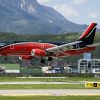 Only months after its launch, Avia Solutions Group’s newest airline, Ascend Airways, has earned approval from the UK Civil Aviation Authority to conduct in-house training for pilots on B737NG and MAX. This approval comes after the airline received additional authorization to expand its AOC for global coverage ahead of the addition of new aircraft to its fleet. Alastair Willson, CEO of Ascend Airways, explains how becoming an Approved Training Organization (ATO) supports the airline’s new worldwide AOC coverage.
Only months after its launch, Avia Solutions Group’s newest airline, Ascend Airways, has earned approval from the UK Civil Aviation Authority to conduct in-house training for pilots on B737NG and MAX. This approval comes after the airline received additional authorization to expand its AOC for global coverage ahead of the addition of new aircraft to its fleet. Alastair Willson, CEO of Ascend Airways, explains how becoming an Approved Training Organization (ATO) supports the airline’s new worldwide AOC coverage.
Under the ATO program, airlines are able to help their crew members with their recurrent training as well as offer the certification to fly the specific type of aircraft in an airline’s fleet. These certifications, known as type-ratings, are usually the last step in a new pilot’s training before flying for an airline; they require hours of simulator training and study for systems specific to their aircraft. Having highly experienced crew members in its rank who were able to serve as instructors and postholder, Ascend Airways began its application process four months ago.
Now approved as an ATO, Ascend Airways can offer in-house type rating training for both the Boeing 737 Next Generation and 737 MAX aircraft in its fleet. With pending fleet additions, Willson shared that the approval extends to the ability to offer type-rating instructor training and provide zero-flight-time take-off and landing training for these aircraft types.
“We have to be able to deliver for our customers, and a key challenge is maintaining a sufficient number of certificated pilots,” Willson said. “Being able to train pilots in-house offers the added benefit of giving us quality control, ensuring the highest standards of safety.”
The International Air Transport Association (IATA) estimates that airlines will need to recruit between 500,000 and 600,000 new pilots over the next two decades. Capability to train pilots will therefore be crucial to any airlines’ success.
Willson stated that to ensure operational resilience, the airline plans to add around 11 pilots per additional aircraft. This would allow the airline to fly up to 450 block hour per month while managing the flexibility required for ACMI operations. The policy has proven effective so far and Ascend Airways has experienced no crew-related cancellation over the summer season.
“Given our fleet expansion, we need to hire between 44 and 48 pilots, and I think 25% of these new pilots will be cadets,” Willson said. “This represents a great opportunity for the new qualified pilots. We are able to do this as we have a highly skilled and experience training team to lead, manage and oversee pilot training during the type ratings and on the linewhich .”
Willson added that during the training of its new pilots, both within and outside the ATO process, the airline is using this time to prepare pilots to approach flight as aviators, practicing judgment, skill, and ability outside the aircraft before flights begin.
“We’re also looking to train what I call the ‘parking brake-on’ skills, which means it’s not just when you climb into the flight deck, but also before you walk onboard,” Willson said. “When you are operating for Ascend Airways, you’ll be operating from different airports and different parts of the world, and you will need greater awareness of what goes on around the aircraft before departure and on arrival.”





